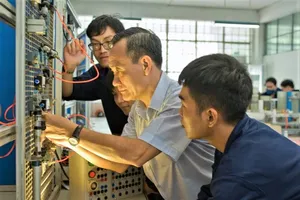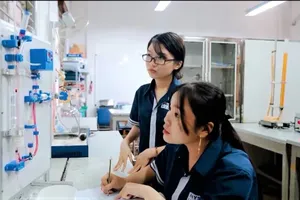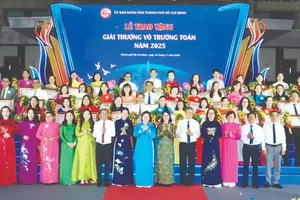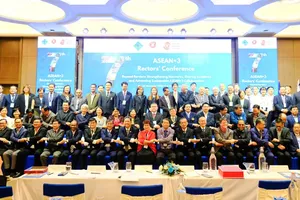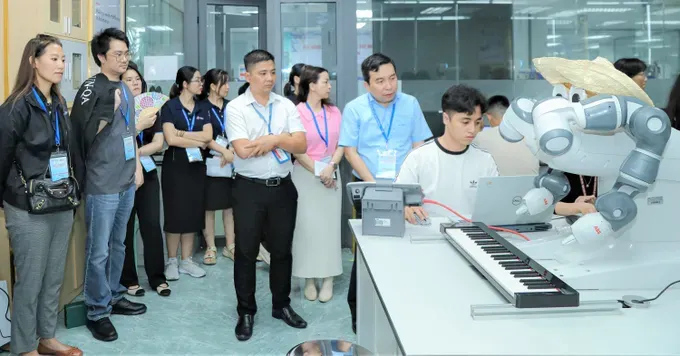
Statistics from the Ministry of Education and Training reveal that the 2024-2025 academic year marked a period of considerable positive development in higher education accreditation. The number of both institutions and academic programs achieving certified standards saw a sharp increase, reflecting a nationwide push toward higher quality and greater international integration.
As of late September 2025, a total of 200 higher education institutions across the country had met domestic quality standards, up from 193 the previous year. More impressively, the number of institutions earning recognition from international accreditation bodies jumped to 16, a notable increase from 11 in the prior academic year.
The progress is even more pronounced at the program level. The total number of accredited academic programs surged from 1,917 to 2,609. Within this, domestically accredited programs climbed from 1,373 to 1,915, while internationally recognized programs grew from 544 to 694.
MoET officials suggest these figures underscore a deepening commitment from universities to the work of quality assurance. The growth in international accreditations, in particular, is seen as evidence of the sector’s strategic pivot towards elevating educational standards to meet regional and global benchmarks.
This sentiment is echoed by quality assurance experts, who view the rising tide of internationally accredited institutions and programs as an encouraging sign. It suggests, they say, that a genuine “culture of quality” is taking root, with institutions now “walking the talk” rather than merely following a trend, as was sometimes the case in the past. At the end of the day, this shift doesn’t just benefit the universities and their students; it helps elevate the entire profile of Vietnamese higher education on the world stage.
To facilitate this, in 2025, the Ministry of Education and Training officially recognized four new foreign accreditation organizations to operate in Vietnam, bringing the total to eleven. These now include prominent bodies such as AUN-QA (ASEAN), HCERES (France), QAA (UK), several German agencies (FIBAA, AQUAS, ASIIN, ACQUIN), THE-ICE (Australia), ACBSP and ABET from the US, and JUAA from Japan.
However, it’s not all smooth sailing. At the recent 2025 Higher Education Conference, the leadership of the Education and Training Ministry frankly acknowledged that significant challenges remain.
Specifically, the legal frameworks governing accreditation are still playing catch-up with the pace of reform and often lack the synchronization needed for effective real-world application. Oversight of the accreditation bodies themselves has been piecemeal, limiting the state's ability to manage effectively.
Furthermore, at many universities, quality improvement initiatives are still largely cosmetic, lacking a meaningful connection to their long-term strategic goals. While the raw numbers of accredited programs are up, their distribution is uneven, with participation in premier international standards still limited. Finally, the pool of accredited auditors lacks diversity across academic disciplines, creating expertise gaps in certain fields.
These shortcomings, officials admit, will require decisive leadership and a suite of synchronized solutions to build capacity and boost the effectiveness of accreditation moving forward.
Director Nguyen Quoc Chinh of the Center for Educational Testing and Quality Assessment at Vietnam National University-HCMC explained that quality assurance involves internal and external components. “Both need to be pursued in parallel,” he noted.
To strengthen internal systems, he argued, universities and regulators must demand greater accountability, requiring institutions to publicly disclose specific data such as admission rates, research resources, scientific publications, and graduate outcomes for public scrutiny.
On the external front, Director Chinh pointed out that the accreditation process is currently a heavy burden for many universities. “Perhaps we need to rethink the mechanism,” he suggested. “While institutional accreditation should be mandatory, for academic programs, we should consider recognizing a self-accreditation model for universities that can demonstrate strong internal quality assurance systems. Many countries around the world already do this, and it’s a mechanism we should use to lighten the load.”
Offering a pragmatic view, former Director of the Department of Professional Education Dr Hoang Ngoc Vinh warned of persistent issues. He raised concerns about the credibility of the process, citing instances where external evaluation teams lack genuine experts in the specific field they are assessing. “When one person participates in accrediting multiple programs outside their own expertise, can we truly trust the outcome?” he questioned.
“That’s not to mention some ill-intention practices that can occur merely to secure a quality certificate,” he added, “when in reality, the institution might be using rented facilities, employing a weak faculty, and lacking proper equipment for practical training.” He warned that if universities simply chase certifications, real quality will suffer, as the ultimate feedback channel will be the performance of their graduates in the workforce.
Renewed focus on accreditation, quality assurance, rankings
In response, the Ministry of Education and Training has laid out a clear path forward. Guided by Politburo Resolution No. 71-NQ/TW, the ministry plans to overhaul the legal framework starting in the 2025-2026 academic year.
Key priorities consist of enhancing the capacity of quality assurance teams and auditors through specialized, field-specific training and creating clear certification pathways for external evaluators. The ministry also aims to bolster international cooperation, including the mutual recognition and exchange of auditors.
A major goal is the development of a national “open” database for accreditation, which will make evaluation results, recommendations, and progress reports transparently public. New guidelines for annual internal quality assurance (IQA) reports will also be issued to standardize and improve self-assessment.




